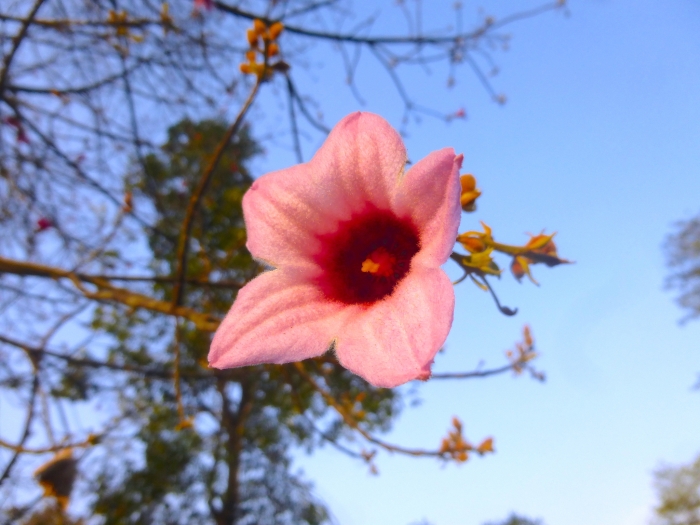Scrub Bottle Tree
(Brachychiton discolor)
Scrub Bottle Tree (Brachychiton discolor)
/
/

Kiri Bee
CC BY 4.0
Image By:
Kiri Bee
Recorded By:
Copyright:
CC BY 4.0
Copyright Notice:
Photo by: Kiri Bee | License Type: CC BY 4.0 | License URL: http://creativecommons.org/licenses/by/4.0/ | Rights Holder: Kiri Bee | Publisher: iNaturalist | Date Created: 2019-11-13T06:50:23-08:00 |























Estimated Native Range
Summary
Brachychiton discolor, commonly known as Scrub Bottle Tree or Lacebark Tree, is a semi-deciduous tree native to the dry rainforests and moist eucalypt forests of Eastern Australia. It can reach up to 30 meters in height with a straight, grey, cylindrical trunk that can be up to 75 cm in diameter. The tree’s canopy is typically dense with large, lobed leaves that provide a lush appearance. From November to February, it produces clusters of bell-shaped flowers that are pink and almost without stalks, measuring 3 to 4 cm in diameter. Although the flowers lack petals, they are quite showy due to their color and abundance. The fruit is a distinctive hairy, boat-shaped follicle that matures from December to July, containing seeds that germinate readily when fresh.
The Scrub Bottle Tree is valued for its ornamental features, including its striking pink flowers and attractive foliage. It is used in cultivation for urban planting, as a feature tree in large gardens, and occasionally as a street tree. It adapts well to a range of soil types, provided they have good drainage, and can tolerate both full sun and part shade. While it can manage with low to medium water availability, regular watering during dry periods will support better growth. This species is not commonly associated with serious pests or diseases, but it can be sensitive to frost when young.CC BY-SA 4.0
The Scrub Bottle Tree is valued for its ornamental features, including its striking pink flowers and attractive foliage. It is used in cultivation for urban planting, as a feature tree in large gardens, and occasionally as a street tree. It adapts well to a range of soil types, provided they have good drainage, and can tolerate both full sun and part shade. While it can manage with low to medium water availability, regular watering during dry periods will support better growth. This species is not commonly associated with serious pests or diseases, but it can be sensitive to frost when young.CC BY-SA 4.0
Plant Description
- Plant Type: Tree
- Height: 15-25 feet
- Width: 12-23 feet
- Growth Rate: Rapid
- Flower Color: Pink
- Flowering Season: Spring, Summer
- Leaf Retention: Semi-Deciduous
Growth Requirements
- Sun: Full Sun, Part Shade
- Water: Low, Medium
- Drainage: Medium, Fast
Common Uses
Bee Garden, Bird Garden, Butterfly Garden, Drought Tolerant, Hummingbird Garden, Low Maintenance, Showy Flowers
Natural Habitat
Native to dry rainforests and moist eucalypt forests of Eastern Australia
Other Names
Common Names: Lacebark Tree, Lace Kurrajong, Pink Kurrajong, White Kurrajong, Hat Tree
Scientific Names: , Brachychiton discolor, Sterculia lurida, Brachychiton luridus, Sterculia discolor, Brachychiton paradoxus subsp. discolor, Brachychiton paradoxus subsp. luridus, Brachychiton paradoxus var. discolor, Brachychiton paradoxus var. luridus, Clompanus discolor
GBIF Accepted Name: Brachychiton discolor F.Muell.